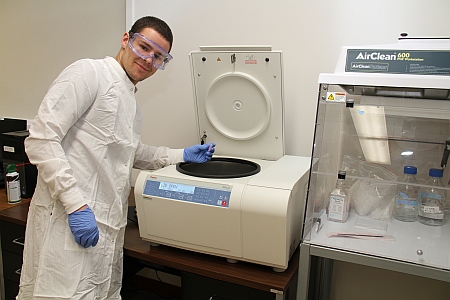The Department of Biomedical Engineering announces the recipients of the 2014 Kenneth L. Stevenson Research Fellows. Two undergraduate and two graduate students are selected annually to receive these competitive research fellowships. The Stevenson Fellows program provides an opportunity for upper-level undergraduate and early-stage graduate students to spend the summer in a total immersion research experience in a biomedical engineering research laboratory. The annual competition is open to students from all academic departments who wish to explore biomedical engineering research and provides a generous research stipend.
 Biomedical Engineering Graduate Seminar: Dr. Monica Hinds, Associate Professor, Department of Biomedical Engineering, Oregon Health & Science University; Friday, 4/18 at 3:00 in U113 M&M
Biomedical Engineering Graduate Seminar: Dr. Monica Hinds, Associate Professor, Department of Biomedical Engineering, Oregon Health & Science University; Friday, 4/18 at 3:00 in U113 M&M
Title: Endothelialization of Vascular Biomaterials
In developing blood-contacting vascular biomaterials, a confluent endothelial cell (EC) monolayer may be required to avoid adverse blood reactions. In vitro, the hemostatic properties (“thrombogenicity”) of ECs have typically been char-acterized using anticoagulated blood, static or non-physiologic flow conditions, and short blood exposure times. Con-sequently, the relevance of these findings for in vivo applications remains uncertain. Moreover, there have been few studies of the reactivity of EC constructs in vivo, and no studies have been reported that systematically relate the in vitro properties of endothelialized surfaces with their responses in vivo. Accordingly, it is now recognized within the tissue engineering community that a key impediment to further progress towards applications in man is the lack of predictive animal models that will enable the rational design of cellular constructs. We are characterizing the in vitro and ex vivo pro-hemostatic and anti-hemostatic properties of ECs (that can affect platelets and coagulation), and im-portant in vivo responses of thrombosis and vascular healing in a physically relevant primate model. Endothelial out-growth cells (EOCs), isolated from the circulating endothelial progenitor cells of baboons, have been seeded on pro-tein-coated ePTFE vascular grafts. We have studied the role of extracellular matrix coatings and hemodynamic pre-conditioning on the EOC phenotype, particularly related to coagulation and inflammation. Subsequently, in an ex vivo baboon shunt model, platelet and fibrin accumulation were measured under conditions of controlled, native blood flow. Finally, the endothelialized vascular grafts were implanted as aorto-iliac interposition grafts for 28 days. After a thorough evaluation of potential correlations, a linear regression model using in vitro data was established to predict platelet accumulation. This regression correlated significantly and strongly to both ex vivo platelet and in vivo intimal hyperplasia data. This is the first work of this type—attempting to determine predictors for vascular graft performance from in vitro endothelial markers, and while future work should examine the scope of the model by applying it to other endothelialized grafts, we are encouraged by these results, which may aid in improving translation of small diameter vascular grafts into clinical improvements.
This seminar is partially funded by the Visiting Women & Minority Lecturer/Scholar Series which is funded by the President’s Office and a grant to the Office of Institutional equity from the State of Michigan’s King-Chavez-Parks Initiative
Keegan Yates, a third-year biomedical engineering major, has been selected to participate in the National Science Foundation Research Experience for Undergraduates, to be held this summer at Virginia Tech.
He is among 10 students selected nationwide to participate in the program, which will focus on multiscale approaches to biomechanics.
Yates has been working on research projects in Assistant Professor Feng Zhao’s (Biomedical Engineering) Stem Cell and Tissue Engineering Laboratory since his freshman year. His major focus has been on the development and characterization of naturally derived biomaterials for tissue engineering. Dr. Zhao said “Keegan is a very smart, reliable, highly motivated and independent student who has good sense of science. Keegan has great potential to become an outstanding scientist.”
He has coauthored three papers and presented at the Biomedical Engineering Society national meeting in 2013, as well as twice at the Biotech Research Center’s student research forum, where he won a merit award in 2013 and a grand prize for best poster in 2014.
Yates will investigate mechanical properties of structures ranging from cellular component to the whole body and determine how this knowledge can help create devices to prevent, diagnose and treat injuries and disease.
The award includes a $4,000 stipend, lodging and transportation to Virginia Tech.
